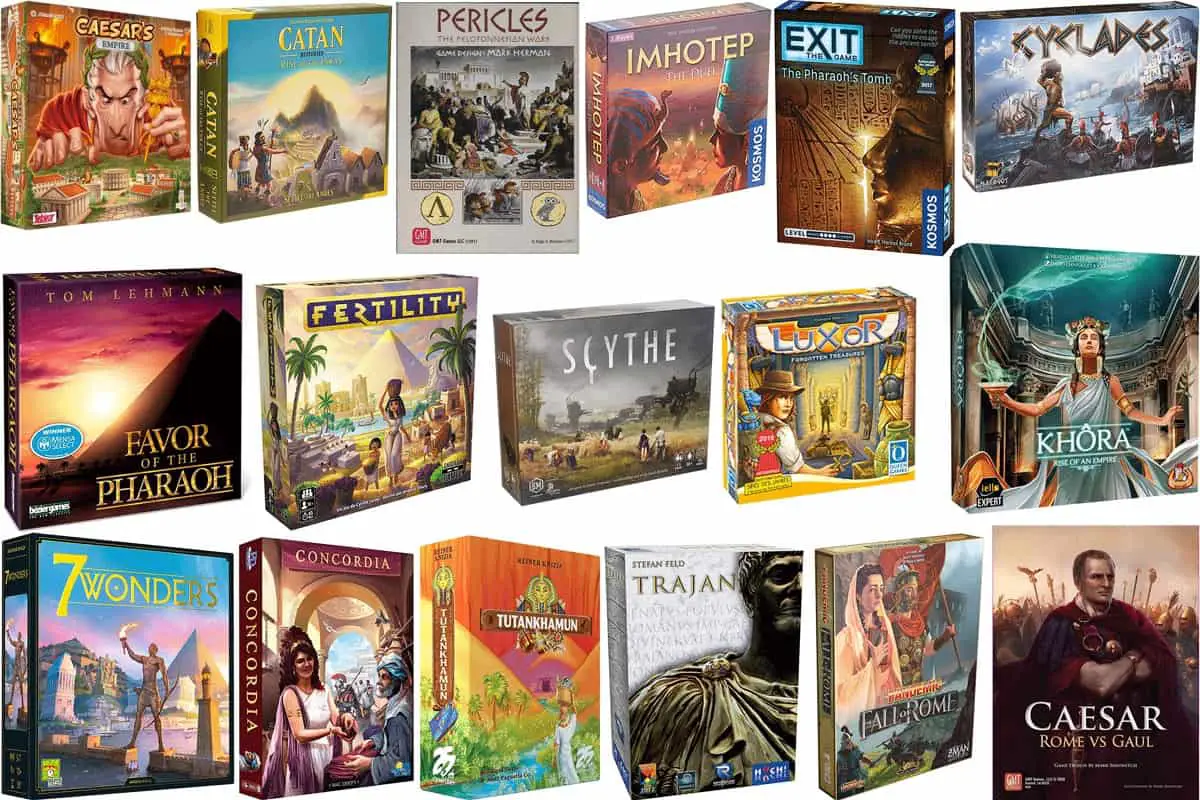This post contains affiliate links.
Who is not fascinated by antique history – for example the Roman Empire and the Egyptians? So I gathered this list of antiquity-themed board games. Of course, I do not expect them to teach history, but I will cover this “educational” aspect although it is not the point of these regular “euro” board games. 10 of them are award-winning board games, including the highly regarded strategy game “7 Wonders”.
History-themed Board Games Comparison Table
| Game | Age | Theme | Players | Price | Rating |
|---|---|---|---|---|---|
| 7 Wonders | 10+ | Antiquity | 2‑7 | $$$ | ★★★★★ |
| Imhotep: Builder of Egypt | 10+ | Egypt | 2‑4 | $$$ | ★★★★☆ |
| Luxor | 8+ | Egypt | 2-4 | $$$ | ★★★★☆ |
| Fertility | 10+ | Egypt | 2-4 | $$$ | ★★★☆☆ |
| Tutankhamun | 14+ | Egypt | 2-6 | $$$ | ★★★☆☆ |
| Favor of the Pharaoh | 13+ | Egypt | 2‑4 | $$$$ | ★★★☆☆ |
| Exit: The Pharaoh’s Tomb | 12+ | Egypt | 1‑4 | $$ | ★★★★☆ |
| Cyclades | 14+ | Greece | 2‑5 | $$$$ | ★★★★☆ |
| Hellenica | 14+ | Greece | 1‑7 | $$$$$ | ★★★☆☆ |
| Khora: Rise of An Empire | 14+ | Greece | 2‑4 | $$$ | ★★★★☆ |
| Pericles: The Peloponnesian Wars | 14+ | Greece | 1‑4 | $$$$ | ★★★☆☆ |
| Caesar: Rome vs. Gaul | 14+ | Rome | 2 | $$$$ | ★★★★☆ |
| Concordia | 12+ | Rome | 2‑5 | $$$$ | ★★★★☆ |
| Pandemic: Fall of Rome | 8+ | Rome | 1‑5 | $$$ | ★★★★☆ |
| Trajan | 12+ | Rome | 3-7 | $$$$ | ★★★☆☆ |
| Caesar’s Empire | 10+ | Rome | 2‑5 | $$$ | ★★☆☆☆ |
| Catan Histories: Rise of the Inkas | 12+ | Inkas | 3‑4 | $$$ | ★★★☆☆ |
7 Wonders (Repos Production)
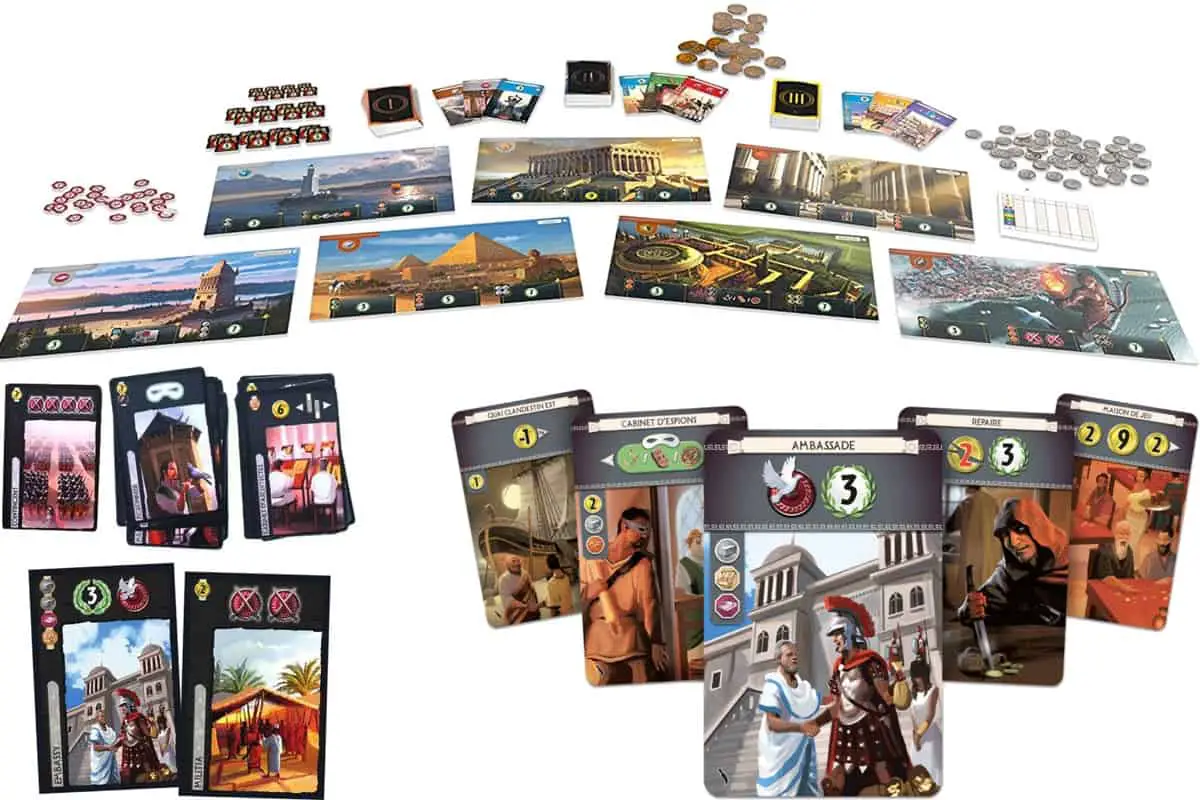
★★★★★
Age 10+ | 2-7 Players | Duration: 30 minutes | Author: Antoine Bauza
7 Wonders is a phenomenon: over 30 gaming awards, including the most prestigious Kennerspiel des Jahres in 2011, more than 2 million copies sold worldwide.
is a phenomenon: over 30 gaming awards, including the most prestigious Kennerspiel des Jahres in 2011, more than 2 million copies sold worldwide.
Playing this strategy game is a great way for children to know the original Seven Wonders of the Ancient World:
- The Temple of Artemis in Ephesos
- The Statue of Zeus in Olympia
- The Lighthouse at Alexandria
- The Hanging Gardens of Babylon
- The Colossus of Rhodes
- The Pyramids of Giza
- The Mausoleum at Halikarnassos
Players will enjoy building one of these wonders while collecting victory points and resources for it.
The setup of this game depends on the player count. There is a specific card selection for two-player variants and multiplayer games (3-7 players).
Players may manage the difficulty because they can choose the side of the wonder board to play.
- A has three stages of building the wonder, but the gameplay is easy.
- B has two stages of building the wonder and provides more compelling benefits.
Each wonder has a specific strategy to win in this game that can be affected by the cards you play. There is a dedicated card deck for each Age, and this game is played over three Ages (a total of 18 turns).
The player who collected the highest victory points at the end of three Ages wins the game.
7 Wonders offers seven options to beat opponents, making it challenging and fulfilling. For example, they can take the military path and discard the cards that won’t help them gather resources for it. (Hoarding money is not a great strategy, though.)
When you unbox 7 Wonders, you’ll find other attractive game components such as coins, military conflict tokens, score pad, description of effect sheets, list of cards, and rulebook.
By Watch it
6 Ancient Egypt-Themed Board Games
Imhotep: Builder of Egypt (Kosmos)
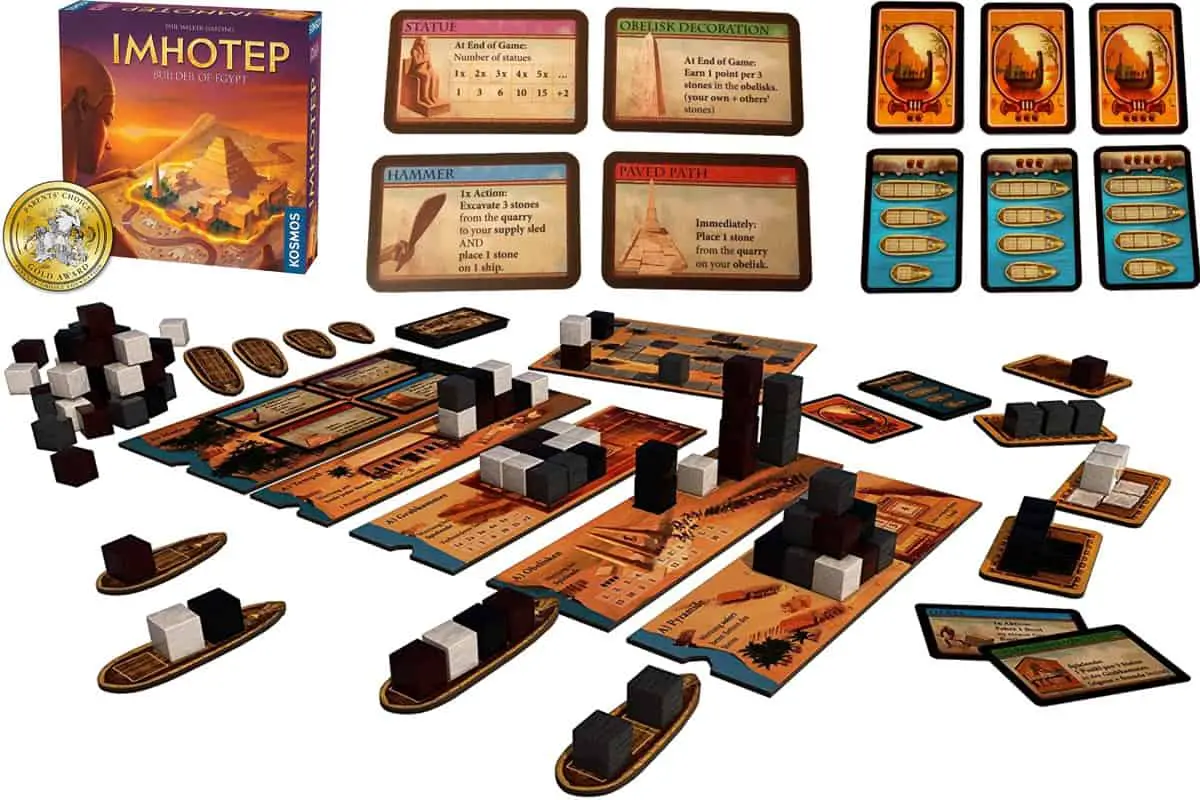
★★★★☆
Age 10+ | 2-4 Players | Duration: 40 minutes | Author: Phil Walker-Harding
Imhotep was the legendary architect of the most revered ancient Egyptian monuments. Hence, if you play Imhotep: Builder of Egypt , your will be exposed to his brutal tactics as a master builder and need determination and strategy to construct burial chambers, markets, obelisks, pyramids, and temples.
, your will be exposed to his brutal tactics as a master builder and need determination and strategy to construct burial chambers, markets, obelisks, pyramids, and temples.
The game’s goal is to send the color-coded wooden blocks called “stones” in the right place, in the right order, and at the right time to gain points. However, your opponents can block your actions, and you cannot choose the construction site your ships can dock.
The winner is the player with the highest score at the end of six-game rounds.
The fascinating points of this game are:
- The cards are double-sided, and you can mix and match them to have a different game experience.
- Sailing and transporting blocks add thrill to the game
- Making decisions at every turn while watching the moves of your opponents
Imhotep: Builder of Egypt is easy to set up, and rather is easy to learn as well.
Incidentally, it was a Spiel des Jahres nominee in 2016, and also received Fall Parents’ Choice Gold Award in 2016, and was chosen as the Best Australian Game in the 2017 Boardgames Australia Awards.
by Tom Vasel
Luxor (Queen Games)
★★★★☆
Age 8+ | 2-4 Players | Duration: 45 minutes | Author: Rudiger Dorn
Luxor is a 2018 Spiel des Jahres nominee. It brought home the JuGuinho Families Game of the Year Award in 2019.
is a 2018 Spiel des Jahres nominee. It brought home the JuGuinho Families Game of the Year Award in 2019.
This family adventure game explores the legendary temple of Luxor. Players take on the role of adventurers who hunt for priceless treasures. Their main goal is to reach the pharaoh’s tomb in the middle of the gameboard while collecting treasures that earn points along the way.
It offers replay value because winning depends on luck and strategy in the placement of tiles and hand management.
Players start the game with 5 cards each. They are not allowed to change the order of the cards. They must perform 3 actions in every turn.
- Select the card to play to the discard pile. (Players can only choose either right or left from the hand of cards)
- Move their token on the gameboard and perform the action on the tile they land on.
- Refill the hand of the card by drawing a card from the pile. The drawn card should be placed in the middle of the hand.
Some special rules are:
- Players need a key to enter the tomb, and they can only obtain it if they land on Horus tile.
- Players can add another adventurer only if they land on the Anubis tile, and they can collect the treasure only if their two adventurers land on the same tile.
As soon as two adventurers reach the tomb, the game is over, and the players with the most points win the game.
Fertility (Catch Up Games)
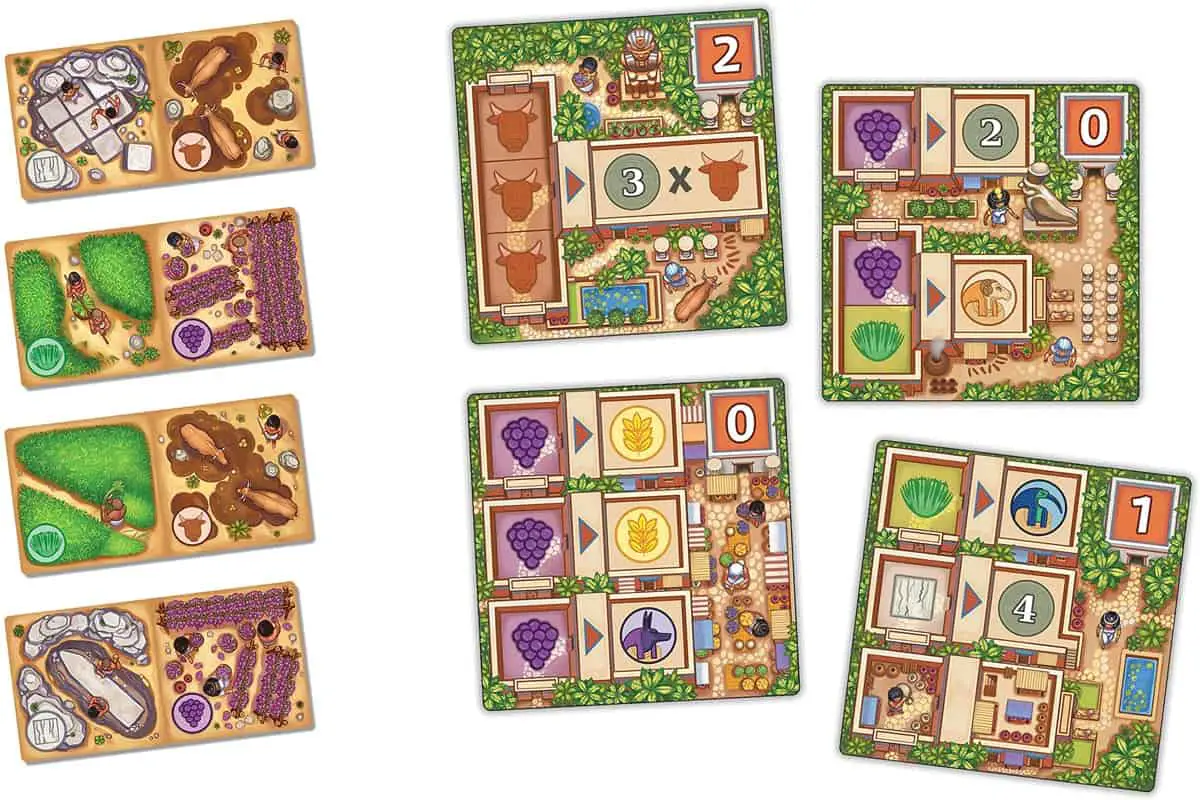
★★★☆☆
Age 10+ | 2-4 Players | Duration: 25-45 minutes
Another game that is easy to explain and play is Fertility. Players assume the role of a provincial governor in ancient Egypt called nomarch. Their assignment includes collecting resources, building districts, supplying shops with resources, and earning Debens in honor of the Pharaoh.
Players assume the role of a provincial governor in ancient Egypt called nomarch. Their assignment includes collecting resources, building districts, supplying shops with resources, and earning Debens in honor of the Pharaoh.
The player with the highest amount of money after nine turns is the winner of the game.
This resource-management game is fast-paced, and the components are of great quality.
Tutankhamun (25th Century Games)
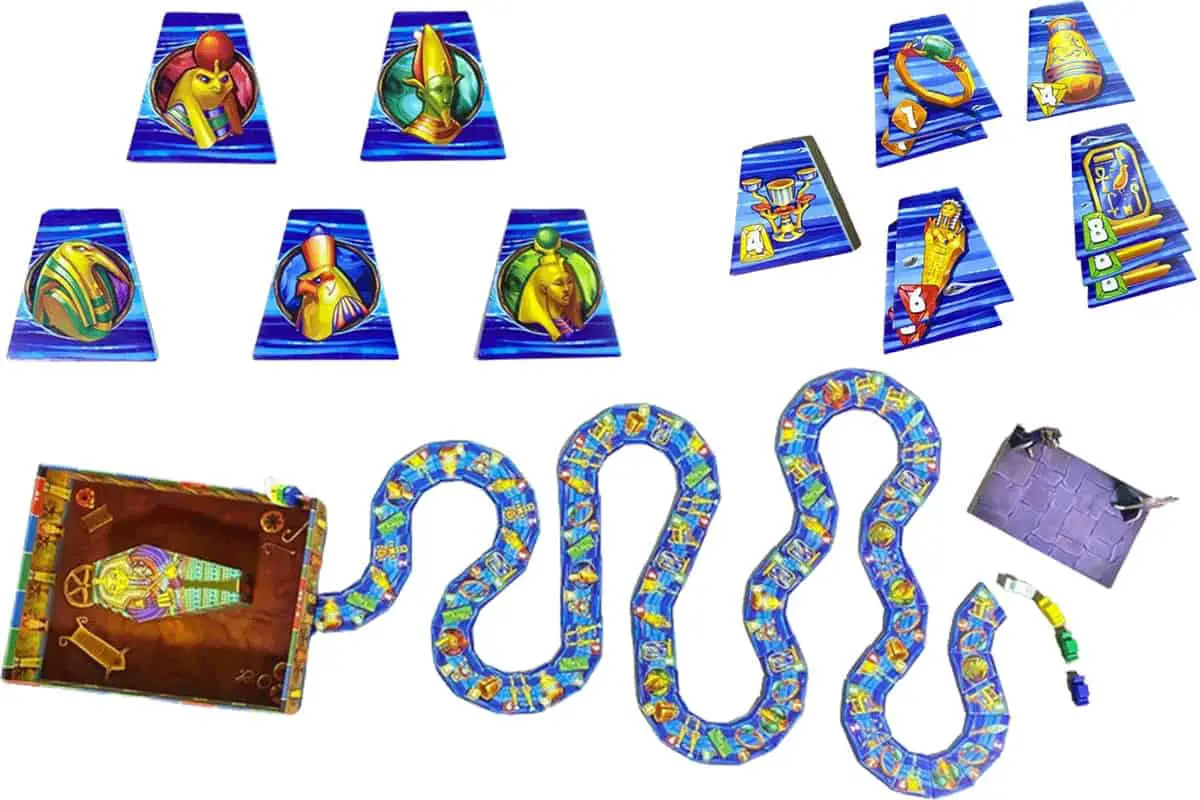
★★★☆☆
Age 14+ | 2-6 Players | Duration: 15-30 minutes | Author: Reiner Knizia
Players take on the role of priests and priestesses who are assigned by the new pharaoh to collect sets of artifacts for the burial preparation of Tutankhamun .
.
For each set of artifacts obtained, the player earns a cleansing of the spirit reward from the new pharaoh. This reward is equivalent to reducing points. The player who reaches zero score wins the game.
Favor of the Pharaoh (Bézier Games)
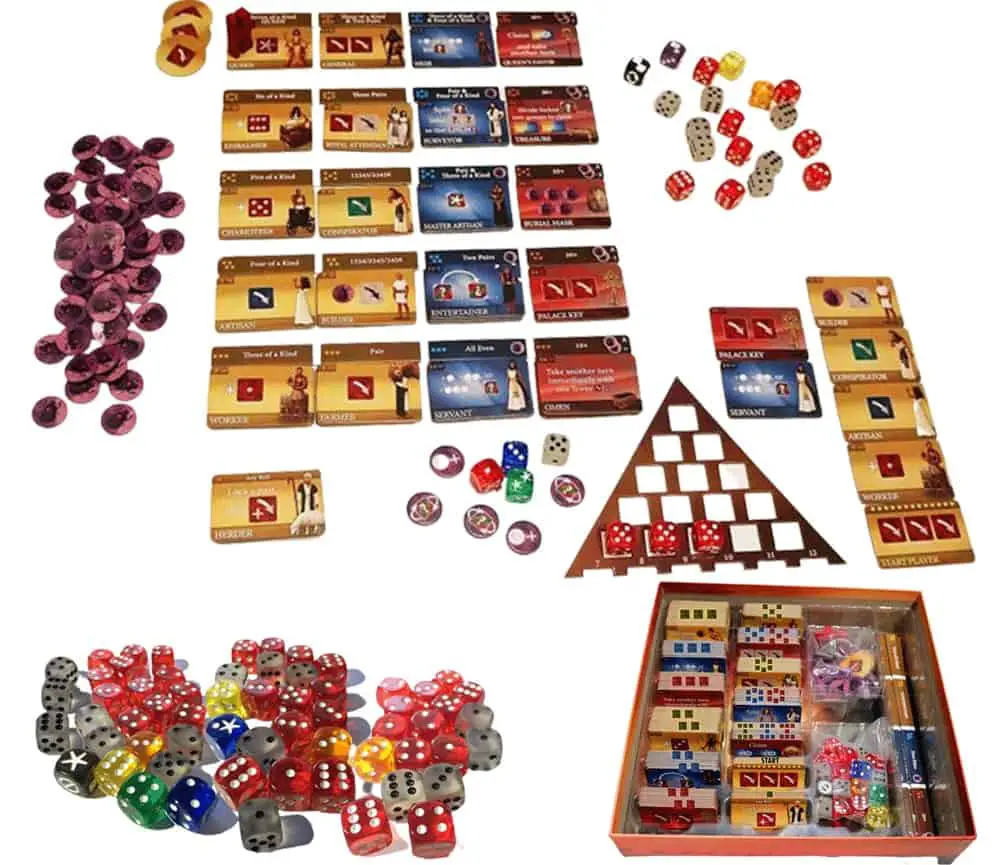
★★★☆☆
Age 13+ | 2-4 Players | Duration: 45 minutes | Author: Tom Lehmann
Favor of the Pharaoh is a dice rolling game that features 51 unique characters, but only 21 of them engage in dice combat.
is a dice rolling game that features 51 unique characters, but only 21 of them engage in dice combat.
The game’s goal is to gain the Pharoah’s favor by recruiting characters and increasing influence at every turn.
Players use 6 custom dice with special powers, 12 standard red dice, 8 immediate frosted dice, and bonus tokens to buy tiles, get more dice and collect better cards to win the game.
This game is great for 2 players, and winning depends on a combination of luck and strategy, making the game interesting (but not educational as there is no side information about ancient Egypt there).
Exit: The Pharaoh’s Tomb (Kosmos)
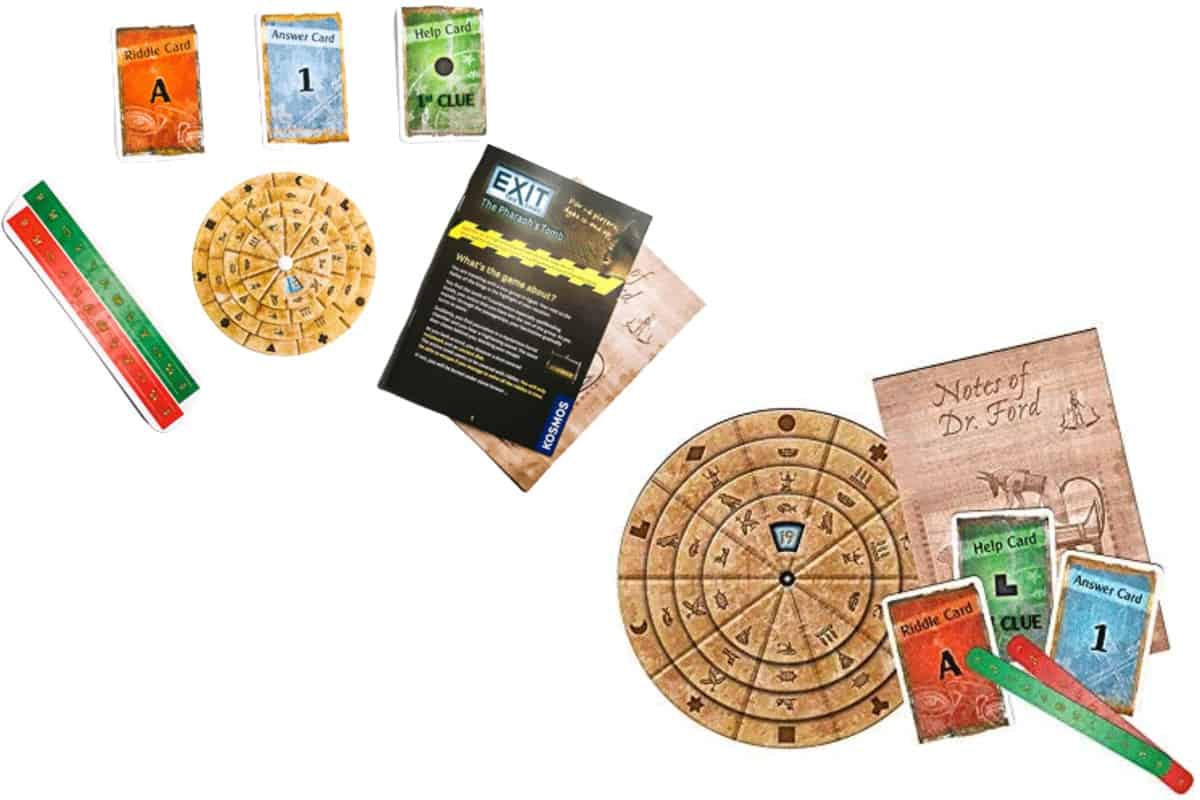
★★★★☆
Age 12+ | 1-4 Players | Duration: 1-2 hours
Exit: The Pharaoh’s Tomb is an escape game that encourages teamwork among 1-4 players in solving riddles, puzzles, and codes within the time limit.
is an escape game that encourages teamwork among 1-4 players in solving riddles, puzzles, and codes within the time limit.
The backstory of this game is that players found themselves trapped in a burial chamber while on an excursion in the Egyptian pyramids. Players find clues using the diary entries of the previous explorer named Dr. Ford.
This game contains a deck of cards, a decoder disk, 2 paper strips with hieroglyphs, an instruction guide, and the diary of Dr. Ford. Ironically, this game does not include a timer.
Its level of difficulty is ideal for experienced players.
Some puzzles might take 1-3 minutes to solve, while some get stuck and spend more than 20 minutes even if they look for clues. Despite these challenges, the themes are unique and entertaining.
Overall, the game is engaging and challenging but not educational because players will not remember specific facts about ancient Egypt. However, the puzzles are named after famous Egyptian figures.
video by Tom Vasel of “Exit: The Pharoah’s Tomb”.
4 Ancient Greece-Themed Board Games
Hellenica (Mr. B Games)
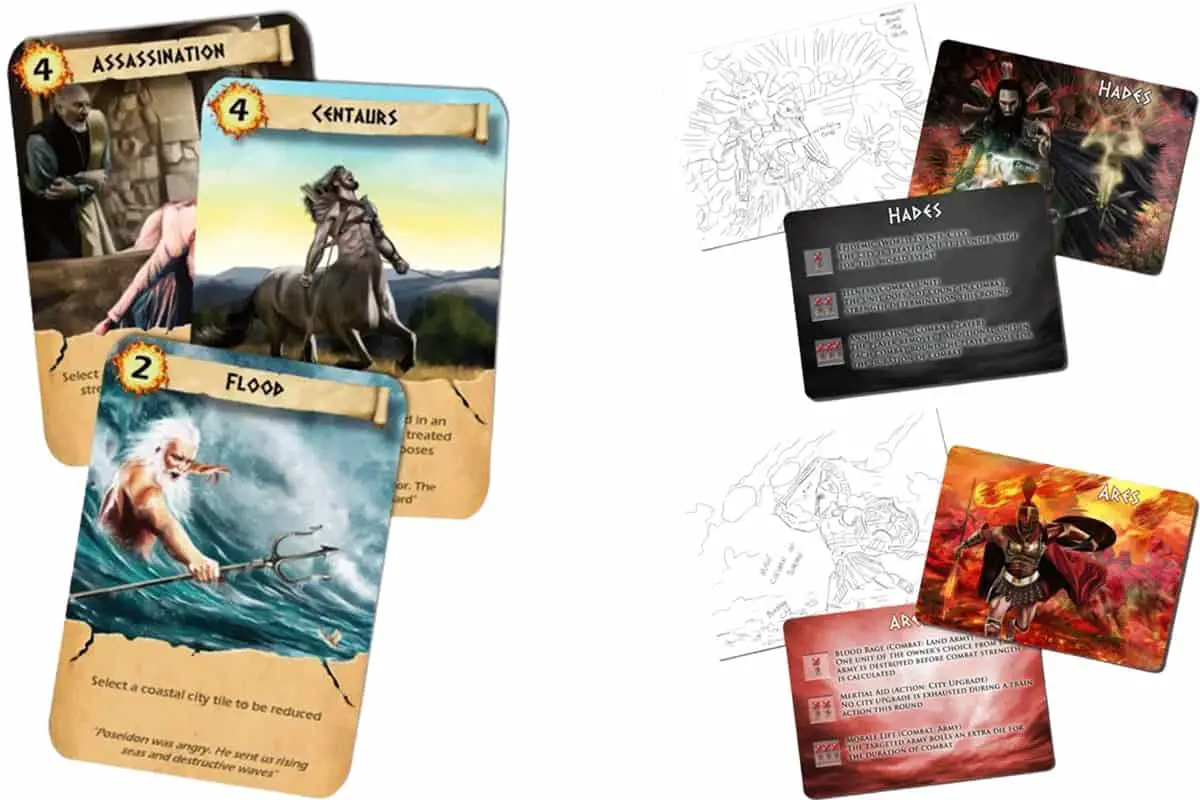
★★★☆☆
Age 14+ | 1-7 Players | Duration: 2+ hours | Author: Scott de Mers
Exploring ancient Greece in 800 B.C is possible with Hellenica.
It is a civilization-building war game where players represent one of the city-states: Athens, Sparta, Corinth, Troy, Byzantium, Corcyra, and Thebes as they vie for dominance in the world.
This game comprises a double-sided gameboard, 156 miniatures, 7 mythological creature counters, 245-unit counters, 198 cards, 190 commodity tokens, 90 temple markers, and 148 tokens.
I like that Hallenica combines the historical and mythological aspects of the ancient Greek civilization. However, the game takes about more than two hours to complete.
Cyclades (Matagot)
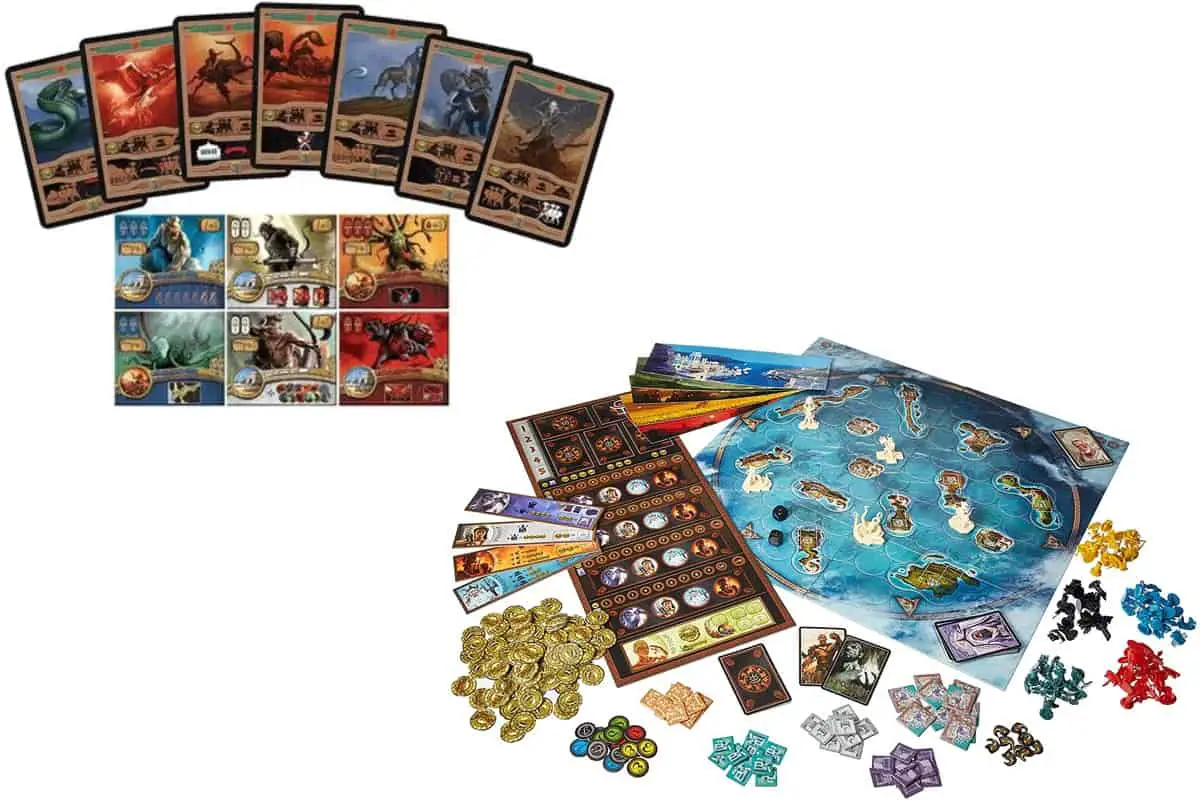
★★★★☆
2-5 Players | Duration: 60-90 minutes | Authors: Bruno Cathala & Ludovic Maublanc
If you would like to illustrate Greece in the Mythical Age, Cyclades is perfect for it. This strategy game won the JoTA Best Heavy Board Game Audience Award in 2010.
is perfect for it. This strategy game won the JoTA Best Heavy Board Game Audience Award in 2010.
Players must pay homage to five Greek gods to be the first player to build two ancient cities or metropolises in the ancient island group in the Aegean Sea known as the Cyclades.
The problem is only one player can obtain the favor of each god, and each player is limited to one favor from each god in every turn.
The following are the favors that each god can grant its followers or worshippers:
- Ares-movement of player armies and building of fortresses
- Poseidon– the movement of player navies and building of ports
- Zeus– hiring of priests and building of temples
- Athena– provides philosophers and universities
- Apollo– increases income
Players obtain the favor through a bidding game.
Interestingly, players may win the game by stealing their opponent’s metropolis. This mechanism causes some players to wait for other players to build the city instead of constructing their own metropolis.
The things I like:
- Players can choose the game variant by flipping each side of the gameboard. There’s a 2 player, up to 5 player game variants.
- The game has cool components, including 95 figurines, 52 beautifully illustrated cards, 2 special dice, 100 gold pieces, markers, and tiles.
- Exciting rules such as:
- Collecting 4 philosophers can instantly construct a metropolis
- The first player to get Apollo’s favor receives a cornucopia that doubles the income of the player on an island
I expected more from the mythological creatures (Pegasus, Kraken, etc.). The artwork on the cards is beautiful, and the figurines look great.
I recommend Cyclades because it is a fun hybrid of an auction and a war game.
by Tom Vasel
Khora: Rise of an Empire (Iello)
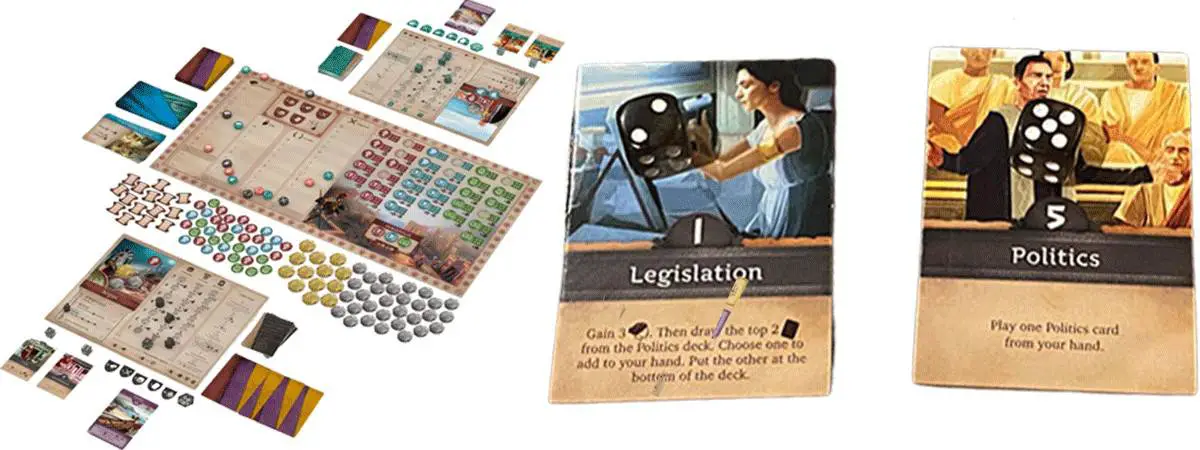
★★★★☆
Age 14+ | 2-4 Players | Duration: 75 minutes
In Khora: Rise of an Empire, players become the ruler of ancient Greece.
players become the ruler of ancient Greece.
Players choose one of the ancient cities in Greece to build and develop using different tracks with a specific strategy. The game consists of 7 actions: Philosophy, Legislation, culture, trade, military, politics, or development.
Players start by choosing two action cards that match their dice, and they optimize their dice rolls to collect taxes, buy tokens, increase troops, and many more.
At the end of the 9th round, the player with the most points wins the game.
This game includes a gameboard, city cards, tokens, player boards, markers, and dice.
Although the components are well-made, the cards do not contain any educational information about the ancient Greek cities.
I like that there are different ways to defeat opponents, which could keep players from playing the game again to try out other tracks.
The lack of direct player interaction works for beginners because they can feel out the strategies they need to win. Players may need 2-3 rounds of play to get around the rules.
On the other hand, this game may become boring if someone is in the lead and the other players cannot do anything.
Pericles: The Peloponnesian Wars (GMT Games)
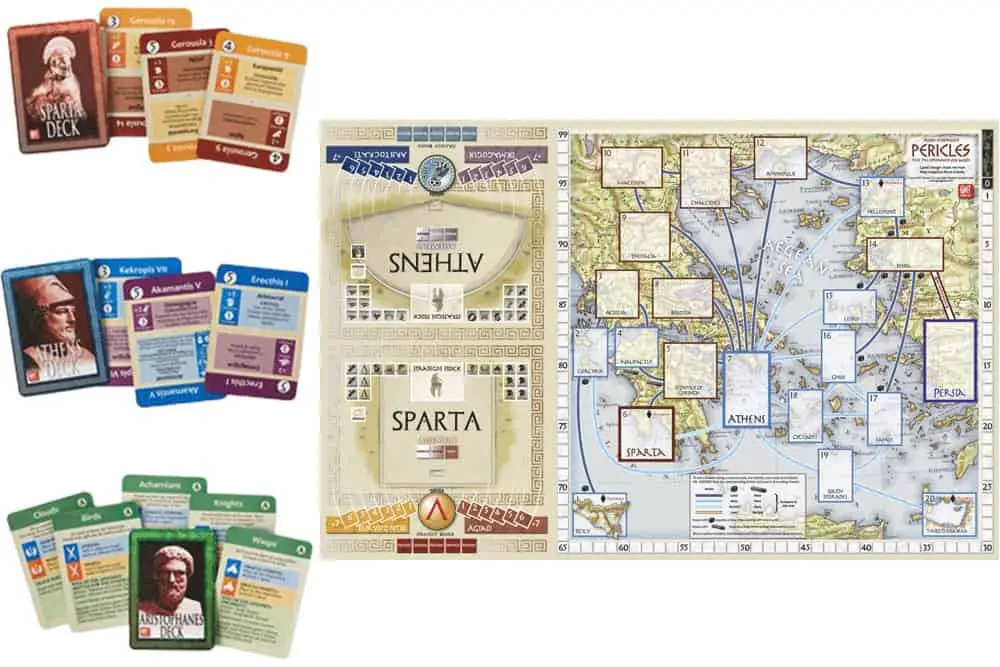
★★★☆☆
Age 14+ | 1-4 Players | Duration: 30-90 minutes | Author: Mark Herman
In Pericles: The Peloponnesian Wars, two players team up to represent either the Athenian house or Sparta to control the city-states in 5th century Greece.
two players team up to represent either the Athenian house or Sparta to control the city-states in 5th century Greece.
This game is comprised of twenty scenarios that differ in playing times:
- 30 minutes for mini-theater scenario
- 45 minutes to simulate the 6 years of the war
- 90 minutes equivalent to a decade of war
Three long scenarios cover the 1st, 2nd, and campaign for the Peloponnesian war.
Also, there are specific rules designed for solitaire, and 2 –3 player variants.
Even though the cards contain historical information, this war game would be too complex for young children. Experienced players will enjoy the simulation of the 27-year political warfare between Athens and Sparta.
5 Ancient Rome-Themed Board Games
Trajan (Renegade Game Studios)
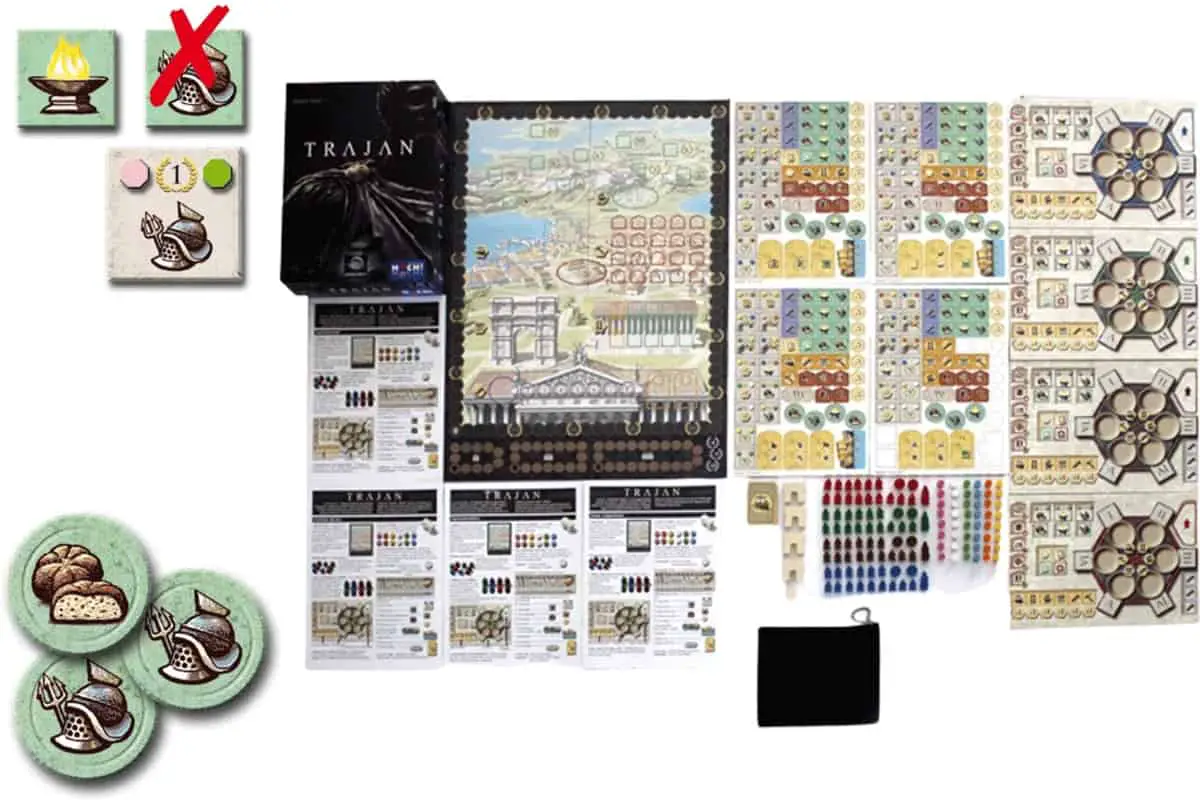
★★★☆☆
Age 12-15 | 2-4 Players | Duration: 1-2 hours | Author: Stefan Feld
Trajan is another award-winning strategy game set in 110 AD. Players will learn to strategize in scoring victory points while avoiding punishment to have a successful Roman life in ancient times.
is another award-winning strategy game set in 110 AD. Players will learn to strategize in scoring victory points while avoiding punishment to have a successful Roman life in ancient times.
This game has six important actions:
- Influencing the Senate
- Increasing military power
- Getting tiles from the forum
- Laying Trajan tiles on the tableau
- Trading
- Building
These actions are indicated on the six bowls on the gameboard. Players use the Mancala system in selecting their action (picking up and moving markers to spaces in a specific direction where the last place has significant value)
The game includes color-coded action markers, player and military tokens, discs, and 60 commodity cards. Each player has a player mat to track his progress.
I like that you can achieve various things in one turn, and the actions are interconnected, so there are many options to score points and win the game.
“Pandemic: Fall of Rome” works.
Caesar: Rome vs. Gaul (GMT Games)
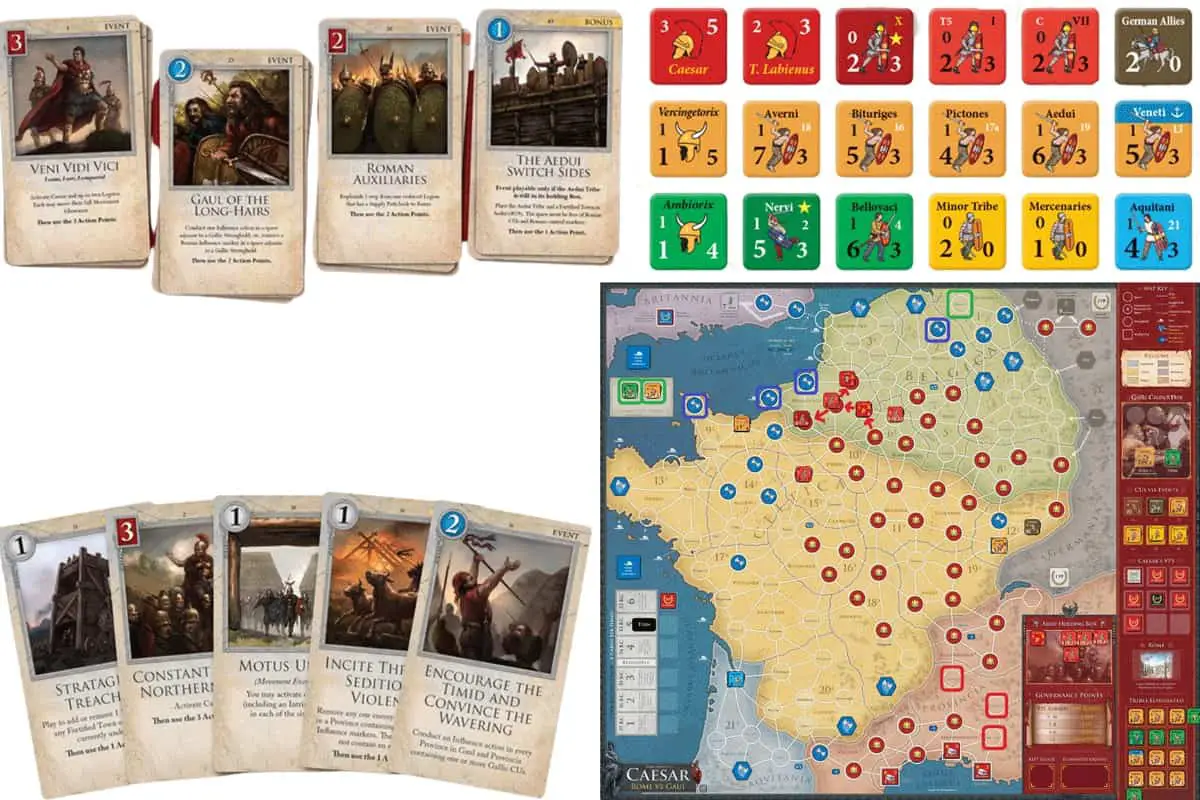
★★★★☆
Age 14+ | 2 Players | Duration: 2-3 hours | Author: Mark Simonitch
Caesar: Rome vs. Gaul won the Charles S. Roberts Best Ancients to Medieval Wargame award in 2020.
won the Charles S. Roberts Best Ancients to Medieval Wargame award in 2020.
This two-player war game will teach your child about the war waged by Julius Caesar to plunder Gaul in 57-52 BC. Gaul was not a unified nation but a region of rival tribes with a shared culture during that time.
This game utilizes the point-to-point movement system reminiscent of Hannibal: Rome versus Carthage (Developed by the same author).
Players must strategize on eliminating the opponent’s armies and control provinces to earn victory points. I like the challenge of aiming for a dice roll to win in combats.
Caesar: Rome vs. Gaul is challenging and unpredictable because the winner of the game can be determined by:
- Automatic victory
- If the Roman player scores less than 3 Governance points during the political phase, the Gallic player wins the game.
- Also, in the political phase, if there are no fortified towns on the map and the Roman player controls most of the provinces in Celtica, Belgica, and Provincia, the Roman player achieves an automatic victory.
- Endgame victory
- The player who represents Caesar and his Roman legions must score 12 victory points after six turns to win the game. If unsuccessful, the Gallic player is the winner.
Players survive the game by choosing the action cards that trigger events that either reward them or hurt their opponent.
I recommend this game because
- it has easy-to-understand rules, and I appreciate that there are design notes to explain their historical context
- The playing pieces are functional, of excellent quality, and easy to use.
This game is easy to learn, but it takes 2-3 hours to play.
Concordia (Rio Grande Games)
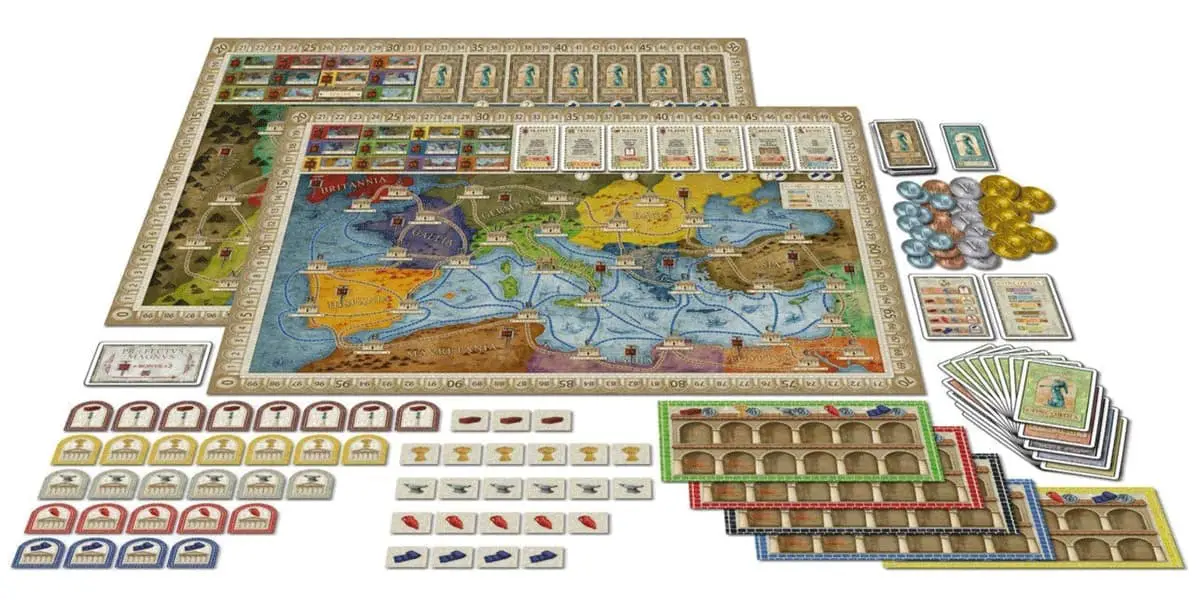
★★★★☆
Age 13+ | 2-5 Players | Duration: 90-120 minutes | Author: Mac Gerdts
Concordia was a Kennerspiel des Jahres nominee in 2014 and had two gaming awards under its belt: the 2013 Meeples Choice Winner and the 2015 Nederlandse Spellenprijs Best Expert Game.
was a Kennerspiel des Jahres nominee in 2014 and had two gaming awards under its belt: the 2013 Meeples Choice Winner and the 2015 Nederlandse Spellenprijs Best Expert Game.
This strategy game features how the Roman dynasties flourished 2000 years ago when the Roman empire enjoyed a thriving economy and peaceful reign around the Mediterranean Sea.
The main attraction is the personality cards because they provide players with a variety of playing power that makes the game exciting and deep in strategy.
This game contains a double-sided gameboard called:
- Empirium- contains the map of the Roman Empire with 30 cities, suitable for 3-5 players.
- Italia- shows Roman Italy with 25 cities, recommended for 2-3 players
Both gameplay options aim to collect the highest victory points to win.
Concordia includes 190 wooden pieces, cardboard components, game rules, and a historical information booklet.
Players represent one of the Roman dynasties and collect victory points by:
- gathering resources like food, bricks, cloth, wine, and tools
- colonizing provinces,
- building trading posts, and
- buying high-scoring cards.
Players begin the game with an identical set of playing cards, and they obtain more cards as they progress in the game. The cards are used for action selection and scoring at the end of the game.
The game ends as soon as a player has built his 15th trading post, or a player buys the last personality card that triggers the final turn for each player. The Concordia card, worth 7 points, is awarded to the player who ended the game.
Pandemic: Fall of Rome (Z-Man Games)
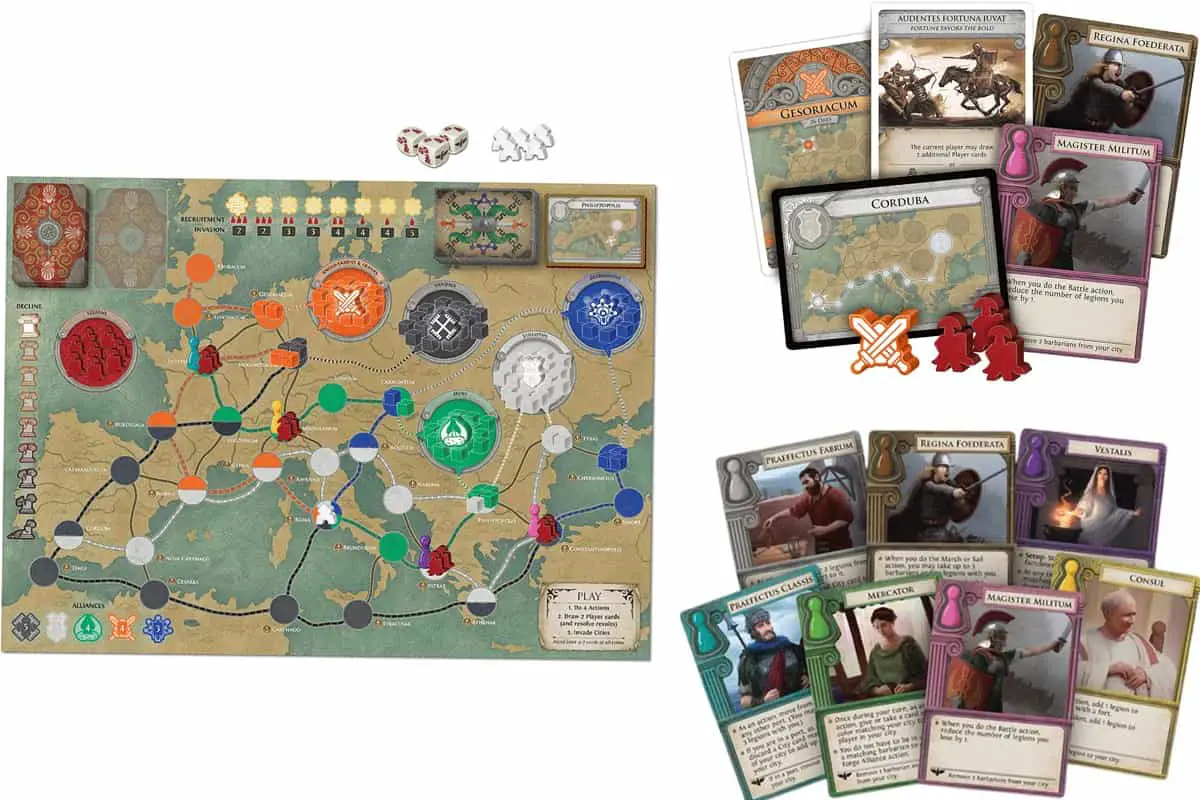
★★★★☆
Age 8+ | 1-5 Players | Duration: 45-60 minutes | Authors: Matt Leacock and Paolo Mori
If you enjoyed Pandemic: Iberia, adding Pandemic: Fall of Rome to your collection could be a great idea. This strategy game was the 2020 Origins Awards Best Historical Game Winner.
to your collection could be a great idea. This strategy game was the 2020 Origins Awards Best Historical Game Winner.
The game features the decline of Rome at the beginning of the 5th century. It depicts how the once-powerful Roman Empire faced incursions from countless tribes, including the Anglo-Saxons, Goths, Vandals, and Huns.
Players try to prevent the fall of Rome into the hands of the barbarian tribes by recruiting armies, defending cities, creating alliances, and stopping the invaders from plundering Rome.
It has two play modes.
- Cooperative game -Players team up to control 7 role cards and use 14 event cards.
- Solitaire– The player acts as the Roman Emperor and uses one hand of cards to control three role cards.
In the cooperative game, players win if:
- There are no barbarians left in any city on the gameboard
- All five barbarian tribes were converted into allies
However, the game ends with players losing if:
- Rome was sacked.
- The Decline marker reaches the 8th space on the Decline track.
- The player cannot draw a card after performing actions (A player can do 4 actions in each turn)
- Players cannot add barbarians to the board when called to do so.
I recommend “Pandemic: Fall of Rome” because:
- I like the mechanism of moving the legions to fight barbarians and enlisting barbarians, then turning them into legions (Adding and removing cubes that represent the tribes and Roman legions)
- The historical notes included in the rules are helpful
- The game components are great
“Pandemic: Fall of Rome” works.
Caesar’s Empire (Holy Grail)
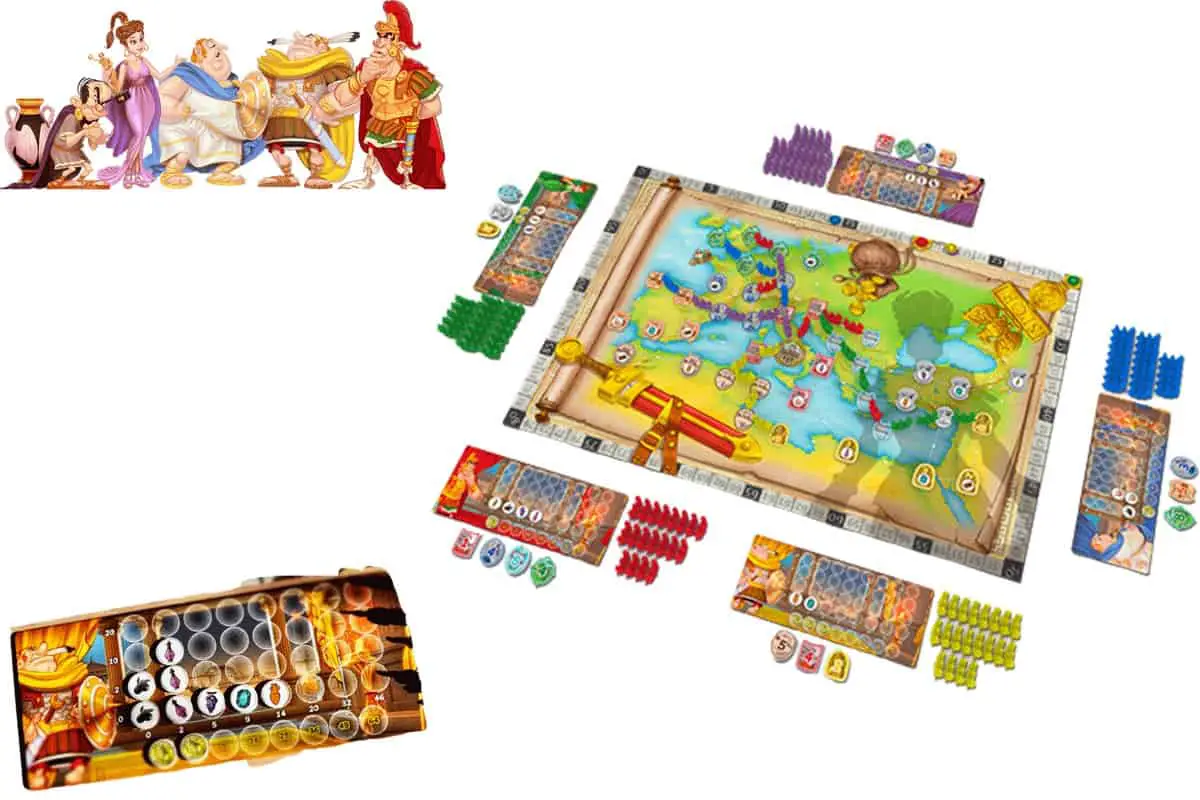
★★☆☆☆
Age 14+ | 2-5 Players | Duration: 20 minutes | Author: Matthieu Podevin
Players expand Caesar’s Empire by building roads that connect Rome to every city included on the gameboard. In return, they earn favor from Caesar. It could be rewards, tokens, or points.
by building roads that connect Rome to every city included on the gameboard. In return, they earn favor from Caesar. It could be rewards, tokens, or points.
The player who scored the most points at the end of the game is the winner.
This game contains a colorful gameboard inspired by Asterix, player mats, markers, and color-coded ships.
Other Antique History-Themed Board Games
Catan Histories: Rise of the Inkas (Catan Studio)
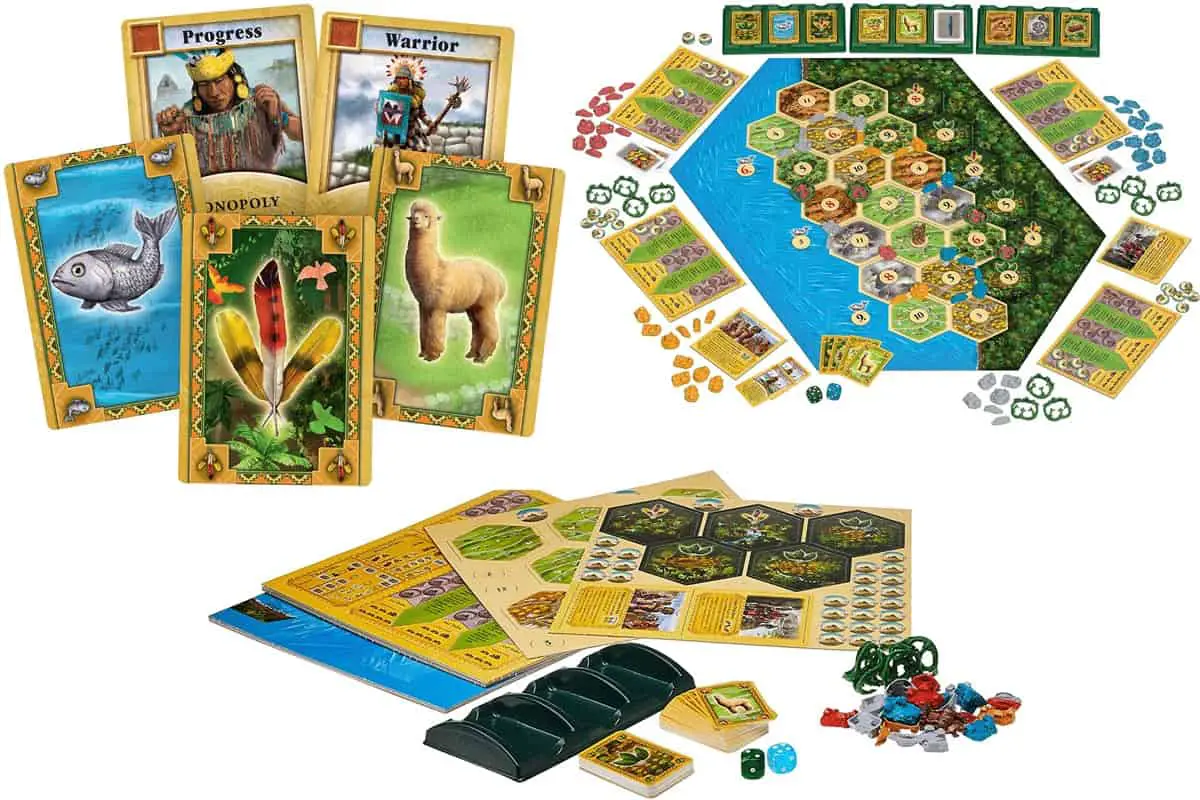
★★★☆☆
Age: 12+ | 3-4 Players | Duration: 90 minutes | Authors: Klaus and Benjamin Teuber
Catan Histories: Rise of the Inkas features the people that paved the way for the Incan empire to rule the Southern American highlands for more than a hundred years.
features the people that paved the way for the Incan empire to rule the Southern American highlands for more than a hundred years.
This strategy game portrays the fall and rebirth of tribes and the emergence of new settlements. It comprises three rounds where players aim to collect 4 points in the first two rounds and 3 points in the last round. The first player to achieve 11 culture points wins the game.
The gameboard consists of 27 hexes that produce resources or goods.
Players roll 2 dice to choose the hex they can acquire. Then, the resources from the acquired hex are used in building roads. The more roads players make, the more settlements they can develop and the more chances to collect culture points.
Other Types of Ancient History Games
If you are interested in other history games, you might want to check these posts:
- 5 Board Games That Teach History

- 6 History-themed War Games

- 14 American History Card Games and Flash Cards for Families and Schools

- 18 Card Games That Teach World History for Families and Schools

- 7 Art History Board Games for School and Home

- 20 Memory Games To Teach Art and Art History

Edudingo.com is a participant in the Amazon Services LLC Associates Program, an affiliate advertising program designed to provide a means for sites to earn advertising fees by advertising and linking to Amazon.com. We also participate in other affiliate programs which compensate us for referring traffic.

